Staff report
The first Earth Day began on April 22, 1970, activating 20 million Americans from all walks of life and launching the modern environmental movement.
The passage of the landmark Clean Air Act, Clean Water Act, Endangered Species Act, and many other groundbreaking environmental laws soon followed.
Twenty years later, Earth Day went global, according to Earth Day Network, mobilizing 200 million people in more than 190 countries and putting environmental issues onto the world stage.

The Earth Day Network says that “in the U.S. and around the world, smog was becoming deadly and evidence was growing that pollution led to developmental delays in children. Biodiversity was in decline as a result of the heavy use of pesticides and other pollutants.
Today, Earth Day is a global event. More than 1 billion people in 192 countries take part in what is the largest civic-focused day of action in the world.
The theme for 2019 is “Protect Our Species.”
People march, sign petitions, meet with their elected officials, plant trees, clean up their towns and roads. Corporations and governments make pledges and announce sustainability measures. Faith leaders, including Pope Francis, connect Earth Day with protecting God’s greatest creations, humans, biodiversity and the planet that we all live on.
Earth Day Network’s mission is to diversify, educate and activate the environmental movement worldwide.
EDN is educating millions of people about health and other risks associated with the use and disposal of plastics, including pollution of oceans, water, and wildlife.
Nature’s gifts to our planet are the millions of species known and many more that remain to be discovered. The greatest rate of extinction is underway since the dinosaurs were lost more than 60 million years ago.
Today we are dealing with climate change, deforestation, habitat loss, trafficking and poaching, unsustainable agriculture, pollution, and pesticides to name a few. The impacts are far-reaching.
Earth Day Network is asking people to join the Protect our Species campaign. Its goals are to:
• Educate and raise awareness about the accelerating rate of extinction of millions of species and the causes and consequences of this phenomenon.
• Achieve major policy victories that protect broad groups of species as well as individual species and their habitats.
• Build and activate a global movement that embraces nature and its values.
• Encourage individual actions such as adopting plant-based diet and stopping pesticide and herbicide use.

Check these numbers from Earth Day Network:
• The number of animals living on the land has fallen by 40% since 1970.
• Marine animal populations have also fallen by 40% overall.
• Overall, 40 percent of the world’s 11,000 bird species are in decline.
• Animal populations in freshwater ecosystems have plummeted by 75% since 1970.
• Insect populations have declined by 75% in some places of the world.
• About a quarter of the world’s coral reefs have already been damaged beyond repair, and 75 percent of the world’s coral reefs are at risk from local and global stresses.
• It is estimated that humans have impacted 83% of Earth’s land surface, which has affected many ecosystems as well as the range in which specific species of wildlife used to exist.
What can you do?
Celebrate Earth Day by appreciating and respecting the natural world.
Here are some ideas to inspire you:
• Plant wildflowers.
• Go native. Plants thrive best when they’re natural to your area.
• Bring nature into the garden with plants that attract butterflies and plants that attract hummingbirds.
• Invite native bees to your garden. These are the bees that pollinate your plants for more flowers and food.
• Start an organic vegetable garden. Don’t you like homegrown vegetables?
• Conserve water. Do you have a rain garden?
• Clean up your community by organizing a group to pick up litter in a local park or roadway.
• Talk to your local government about planting more trees and native garden beds in public spaces and consider planting your own on your property.
• Cut back on plastic consumption. Have you stopped using plastic straws yet?
• Recycle in the garden. Reuse plant pots and containers for starters.
• Reuse, reuse, reuse.



















